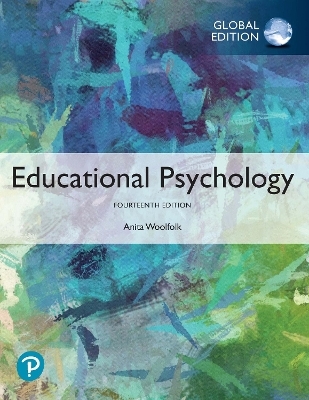
Educational Psychology, MyLabSchool Edition
Pearson
978-0-205-46487-6 (ISBN)
- Titel erscheint in neuer Auflage
- Artikel merken
Written with an emphasis on helping readers understand and develop expertise in both teaching and learning, this book focuses on the science of educational psychology and the art of what it takes to become an expert teacher.
Rather than glossing over theory and focusing primarily on skills, Sternberg and Williams offer a crystal-clear, in-depth presentation of both the science (principles and research) and art (practice and applications) of teaching. Principles are illustrated through the practice of expert teachers to encourage personal reflection by the reader. By helping readers discover what it takes to become expert students, as well as expert teachers, the book gives unique insight into the teaching-and-learning process.
Emphasis throughout the book on creative, analytical, and practical thinking skills encourages deeper understanding of concepts, stretches the thinking process, and applies learning to everyday events. This Triarchic Theory of Human Intelligence, developed by Robert Sternberg, specifically addresses important issues such as critical thinking, diversity, and student achievement.
Each Chapter begins with "The Big Picture" and concludes with "Summing It Up,": Key Terms and Definitions," "Becoming an Expert: Questions and Problems," and "Technology Tools You Can Use."
1. Becoming an Expert Teacher; Becoming an Expert Student.
The "Thinking" Triangle.
What Is An Expert Teacher?
What Do We Know About Expert Students?
Educational Psychology and the Creation of Expert Teachers and Expert Students.
I. HUMAN DEVELOPMENT.
2. Cognitive Development.
Cognitive Development: Concepts for Teaching.
Piaget's Stage Theory of Cognitive Development.
Vygotsky's Sociocultural Theory of Cognitive Development.
Information Processing Theories: Examining Learning and Memory Skills.
Three Major Approaches to Cognitive Development: A Comparison.
Language Development.
3. Personal, Gender, Social, and Moral Development.
Why Understanding Personal, Gender, Social, and Moral Development Is Important to Teachers.
Personal Development: Becoming Unique.
Sexual and Gender Development: Acquiring Gender Roles.
Social Development: Learning to Interact with Others.
Moral Development: Acquiring a Sense of Right and Wrong.
Identifying, Understanding, and Managing Developmental Risks.
II. HUMAN DIVERSITY.
4. Individual Differences: Intelligence, Cognitive and Learning Styles, and Creativity.
Why Understanding Individual Differences Is Important to Teachers.
Understanding Individual Differences in Intelligence.
Current Educational Controversies in Intelligence.
Cognitive Styles and Learning Styles.
Understanding Individual Differences in Creativity.
5. Individual Differences: Exceptional Children.
Why Understanding Exceptional Children Is Important to Teachers.
Teaching Exceptional Children.
Extremes of Intellectual Functioning: Giftedness.
Extremes of Intellectual Functioning: Mental Retardation.
Challenges to Learning.
6. Group Differences: Socioeconomic Status, Ethnicity, Gender, and Language.
Why Understanding Group Differences Is Important to Teachers.
Socioeconomic Diversity.
Ethnic and Racial Diversity.
Gender Diversity.
Language Diversity.
Multicultural Education.
III. THINKING, LEARNING, AND MEMORY.
7. Behavioral Approaches to Learning.
Why Understanding Behavioral Learning Is Important to Teachers.
Learning by Classical Conditioning.
Learning by Operant Conditioning.
Social Learning.
Cognitive-Behavioral Modification.
8. Cognitive Approaches to Learning.
Why Understanding Cognitive Approaches to Learning Is Important to Teachers.
The Standard Memory Model.
Alternative Models of Memory.
Retrieving Information.
Constructivist Approaches.
9. Thinking: Concept Formation, Reasoning, and Problem Solving.
Why Understanding Thinking Is Important to Teachers.
Concept Formation.
Reasoning
Problem Solving.
Transfer.
Teaching for Thinking.
IV. MOTIVATION AND INSTRUCTION.
10. Motivating Students.
Why Understanding Motivation Is Important to Teachers.
Intrinsic and Extrinsic Motivation.
Four Ways to Understand Motivation.
The Role of Arousal Level.
The Role of Student Goals.
The Role of Student Needs.
The Role of Student Attributions and Beliefs.
Motivating Challenging Students.
11. Classroom Management.
Why Understanding Classroom Management Is Important to Teachers.
How Effective Teachers Manage Their Students.
Developing and Implementing Rules and Procedures.
Maintaining Control and Preventing Problems.
Special Approaches to Classroom Management.
12. Classroom Teaching.
Why Understanding Classroom Teaching Is Important to Teachers.
Principles of Teacher-Centered Teaching.
Principles of Student-Centered or Constructivist Teaching.
V. ASSESSMENT.
13. Standardized Testing.
Why Understanding Standardized Testing Is Important to Teachers.
What Are Standardized Tests?
Types of Standardized Tests.
Assessing Test Quality.
Interpreting Standardized Test Scores.
Issues and Concerns in Standardized Testing.
14. Classroom Assessments.
Why Understanding Classroom Assessments Is Important to Teachers.
Traditional Assessments.
Authentic Assessment.
Grading and Reporting.
References.
Name Index.
Subject Index.
| Erscheint lt. Verlag | 15.2.2005 |
|---|---|
| Sprache | englisch |
| Gewicht | 1293 g |
| Themenwelt | Geisteswissenschaften ► Psychologie ► Pädagogische Psychologie |
| ISBN-10 | 0-205-46487-4 / 0205464874 |
| ISBN-13 | 978-0-205-46487-6 / 9780205464876 |
| Zustand | Neuware |
| Informationen gemäß Produktsicherheitsverordnung (GPSR) | |
| Haben Sie eine Frage zum Produkt? |
aus dem Bereich



